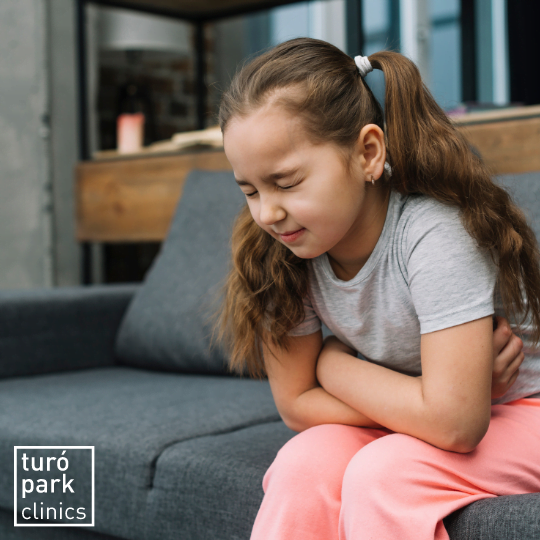Are you looking for a paediatric gastroenterologist in Barcelona?
Paediatric gastroenterology is a medical speciality dedicated to conditions and diseases affecting the liver or digestive system from birth to late adolescence.
At Turó Park Medical Clinic, our specialist paediatricians offer individual attention to all problems affecting the child's digestive tract and pancreas, whether they are common, such as constipation, reflux, etc., complex, such as chronic inflammatory bowel disease, or rare, such as congenital diseases of the digestive tract.
If your child has a digestive or nutritional problem, do not hesitate to make an appointment with one of our paediatricians.
Fast-track your treatment!
To make an appointment or speak with one of our team members, please contact us using the options below.

Why consult a paediatric gastroenterologist?
Digestive and nutritional pathologies in children are a frequent reason for consultation in paediatrics.
If your child suffers from painful colic, frequent diarrhoea, unexplained abdominal pain or vomiting accompanied by strong odours, it is essential to present him or her to a paediatric gastroenterologist. Indeed, the gastroenterologist is the specialist who can treat this kind of disorder, especially in a child who must be closely monitored for any treatment.
Depending on your child's symptoms, history and the clinical examination carried out by the specialist, specialised tests such as PHmetry, endoscopy, breath test or manometry can be carried out to establish a diagnosis.
The main reasons for consulting a specialist in paediatric gastroenterology are as follows:
Almost all infants experience episodes of gastroesophageal reflux disease (GERD), which is characterised by spitting up, burping or salivation. Spitting up normally occurs shortly after feeding and is considered normal.
However, GERD becomes pathological when :
- It interferes with feeding and growth,
- It damages the oesophagus (oesophagitis),
- It causes breathing difficulties (such as coughing, wheezing or apnoea),
- It continues after the child is 3 years old.
Chronic inflammatory bowel diseases (IBD) include Crohn's disease and haemorrhagic rectocolitis.
Affecting approximately 1 in 1,000 people in Western countries, they most often occur in young adults, and increasingly in childhood, with approximately 30,000 children and adolescents affected in France.
IBD causes symptoms that can severely affect patients' quality of life: severe fatigue, frequent diarrhoea, abdominal pain, loss of appetite, weight loss, fever and even joint, eye or skin inflammation. They have a considerable impact on the daily, social and school life of children.
In its classic form, celiac disease begins in infants over 6 months of age, a few weeks after the introduction of gluten into the diet. It manifests itself as chronic diarrhoea with abundant stools, accompanied by anorexia and apathy.
Pancreatitis is characterised by the self-digestion of the pancreatic gland by its own enzymes. It is a serious and rare condition in children.
The most common symptom is severe abdominal pain, usually in the upper and left side of the abdomen. The pain may be accompanied by nausea or vomiting. The patient may also have a fever, but this is rare.
Constipation in children is most often related to feeding, stress or toilet training. However, it can be a symptom of a more serious illness, especially in infants.
Encopresis is when a child over the age of three is unable to hold in his or her stools. While malformations of the digestive organs or neurological abnormalities may be involved, encopresis is most often related to constipation. Stools accumulate in the rectum and the child loses the sensation of having to go to the toilet.
Oral disorders are difficulties related to eating that children may have from an early age.
These disorders cover a wide range of symptoms, which vary greatly in nature and intensity depending on the child:
- Sensory disorders,
- Food selectivity,
- Disgust for food,
- Gastro-oesophageal reflux,
- Neophobia of food that persists over time.
How do you prepare for your first paediatric gastroenterology consultation at Turó Park Clinics?
During the first consultation, the paediatrician meets with the young patient and his/her parents to find out more about the symptoms of the digestive disorder, the date and context of its onset, as well as the medical and family history.
The paediatrician will then carry out a clinical examination and, if necessary, additional tests such as an endoscopy, abdominal ultrasound or proctological examination.
For a complete consultation, remember to bring all the results of previous examinations (biological analyses, ultrasounds, etc.) of your child.
We take care of your children
Our paediatricians are sensitive to the cultural preferences of parents and children and offer them personalised and compassionate care.

Our paediatrician specialising in gastroenterology
